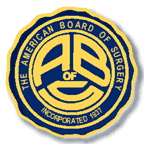The American Board of Surgery (ABS) was founded in 1937 for the purpose of certifying those surgeons found to be qualified after meeting specific requirements and completing an examination process. A major reason for establishing the specialty board was to identify the surgeon who has met a high standard of excellence.
To be board certified in surgery (general surgery) and related specialties means a surgeon has earned a "seal of approval" from the ABS. This approval should give patients a good measure of confidence in the abilities of their surgeon, if he or she is board certified.
The ABS is an independent, non-profit organization with worldwide recognition. It is one of the 24 certifying boards that are members of the American Board of Medical Specialties. The directors of the ABS are distinguished surgeons in education, research, and practice in the United States.
The ABS offers board certification in the following surgical specialties:
- Surgery (general surgery)
- Vascular surgery
- Pediatric surgery
- Surgical critical care
- Complex general surgical oncology
- Surgery of the hand
- Hospice and palliative medicine
Pediatric surgery, surgical critical care, complex general surgical oncology, surgery of the hand, and hospice and palliative medicine are also referred to as "subspecialties" of surgery.
Not all surgeons are ABS certified. Board certification by the ABS is a voluntary process that demonstrates a surgeon's commitment to lifelong learning and quality patient care.
Only those surgeons who have completed at least five years of training in a general surgery residency program approved by the Accreditation Council for Graduate Medical Education (ACGME), such as Stony Brook Medicine's surgical residency, can apply to be board certified in surgery.
Graduates of residency programs approved by the Royal College of Physicians and Surgeons of Canada qualify, as well. The same is true for vascular surgery and our residency program in vascular surgery. Fellowship training in subspecialties must also be completed in ACGME-accredited programs in order for a surgeon to obtain ABS certification.
ABS certification recognizes individuals who have met the highest standards of education, training, and knowledge specifically in the area of general surgery and its related specialties. Board certification is different from possessing a medical license, which is the minimum required by law to practice medicine and is not specialty specific.
SURGERY (GENERAL SURGERY). A general surgeon has principal expertise in the diagnosis and care of patients with diseases and disorders affecting the abdomen, digestive tract, endocrine system, breast, skin, and blood vessels. A general surgeon is also trained in the care of pediatric and cancer patients and in the treatment of patients who are injured or critically ill. Common conditions treated by general surgeons include hernias, breast tumors, gallstones, appendicitis, pancreatitis, bowel obstructions, colon inflammation, and colon cancer. Some general surgeons pursue additional training and specialize in the fields of trauma surgery, transplant surgery, surgical oncology, pediatric surgery, vascular surgery, and others. The period of specialty training required prior to board certification is five years.
VASCULAR SURGERY. A vascular surgeon has expertise in the diagnosis and management of patients with disorders of the arterial, venous and lymphatic systems, excluding vessels of the brain and the heart. Board certified vascular surgeons, by virtue of extensive training, have significant experience in providing comprehensive care of patients with all types of vascular disease, including diagnosis, medical treatment and reconstructive vascular surgical and endovascular techniques. Common interventions performed by vascular surgeons include the opening of blocked arteries, repair of veins to improve circulation, treatment of aneurysms (bulges) in the aorta, and treatment of vascular injuries. The period of specialty training required prior to board certification is five to seven years.
PEDIATRIC SURGERY. A pediatric surgeon is a general surgeon with specialized training in the diagnosis and care of premature and newborn infants, children, and adolescents. This care includes the detection and correction of fetal abnormalities, repair of birth defects, treatment of injuries in children and adolescents, and the treatment of the pediatric cancer patient, as well as conditions treated in adults by general surgeons, such as appendicitis, hernias, acid reflux, and bowel obstructions.
SURGICAL CRITICAL CARE. A surgeon trained in surgical critical care has expertise in the diagnosis, treatment, and support of critically ill and injured patients, particularly trauma victims and patients with multiple organ dysfunction. In addition, these surgeons are responsible for coordinating patient care among the primary physician, critical care staff, and other specialists.
COMPLEX GENERAL SURGICAL ONCOLOGY. A surgeon trained in complex general surgical oncology has expertise in the diagnosis, treatment, and rehabilitation of patients with cancer, especially those with rare, unusual, and/or complex cancers. These surgeons typically work in cancer centers or academic institutions and coordinate patient care with other cancer specialists. They also provide community outreach in cancer prevention and education, as well as lead cancer studies.
SURGERY OF THE HAND. A surgeon trained in surgery of the hand has expertise in the surgical, medical, and rehabilitative care of patients with diseases, injuries, and disorders affecting the hand, wrist, and forearm. Common conditions treated by a hand surgeon include carpal tunnel syndrome, trigger fingers, ganglia (lumps), sports injuries to the hand and wrist, and hand injuries involving cut tendons, nerves, and arteries. Hand surgeons may be general surgeons, orthopedic surgeons, or plastic surgeons who have received additional training in this area.
HOSPICE AND PALLIATIVE MEDICINE. A surgeon trained in hospice and palliative medicine has special knowledge and skills to prevent and relieve the suffering experienced by patients with life-limiting illnesses. This specialist works with an interdisciplinary hospice or palliative care team to optimize quality of life while addressing the physical, psychological, social, and spiritual needs of both patient and family.

